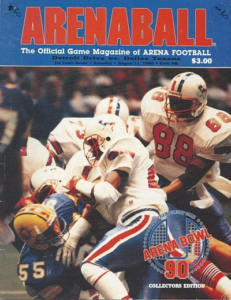By David Mullen
For sports junkies, it is always interesting to peruse the agate type in the back of the sports page. That is the small type that is used to list transactions, horse racing results and standings of the lesser known professional sports leagues.

Photos courtesy of Funwhileitlasted.net
I saw that Major League Soccer (while increasingly popular, still must fight for space on the sports pages) has 23 teams across North America, the Women’s National Basketball Association has 12 teams including the Dallas Wings, the National Women’s Soccer League has nine teams, and World Team Tennis (that is still around?) has six teams.
Buried within the baseball players being designated for assignment and NASCAR driver rankings were the standings for the Arena Football League (AFL) that at one time captured the fancy of football fans in Dallas during the spring and summer months as they waited for “real football” to begin.
The AFL currently consists of six teams: the Albany Empire, Philadelphia Soul, Washington Valor, Baltimore Brigade, Columbus Destroyers and Atlantic City Blackjacks. Sports are clearly running out of team nicknames.
Former NFL tight end Kent Kramer was once an owner of the Dallas Texans of the AFL. “I think it a fast-paced, exciting game,” Kramer said. “But it is for small market venues. They will support them. With all of the teams now in the Northeast, there is not a lot of travel expense. You can keep costs down.”
I was a Texans season ticket holder. I had four tickets on the 25-yard line. Arena football is played on a 50-yard long field, but has the same width as an NFL football gridiron. Going to games at Reunion Arena were affordable and fun. The games were full of action, almost always consisted of passing plays and had lots of scoring. There are eight-man units on the field, no punts, as all teams must attempt a field goal on fourth down, and the football could be returned even if it caromed off of the protective netting. Many of the athletes were two-way players (starting on both offense and defense).
So what happened to the Arena Football League in Dallas?
“Dallas was a great market,” Kramer said. “When Lanier Richey owned it [Dallas’ first owner of an AFL team before Kramer], the team was financially stable and could afford to operate. He wanted to pass it to his son to run it, but his son didn’t like it. So we raised the capital, he sold it to me and we were able to operate it. But it wasn’t a good investment. So we sold it. The [team and league suffered from the] lack of educated, experienced football operational guys to run it and that is why it failed.”
In 1993, the Texans were dropped from the AFL due to being unable to meet financial requirements.
In 2000, Jerry Jones was awarded an expansion franchise in Dallas and called them the Dallas Desperados. They played from 2002 to 2008. The team folded on Aug. 4, 2009.
Dallas actually had three teams in the various incarnations of the arena league: the Texans, the Desperados and the Texas Revolution. Kramer, who played in Super Bowl IV with the Minnesota Vikings, owns the sports marketing firm Professional Sports Marketing in McKinney and remains a part of the NFL Alumni Association.
“I think there is a shrinking of underlying football interest,” Kramer said. “I think it is a multiple of things. I think the concussion portion creates mothers to not encourage their kids to participate. And look at our market here. You have kids playing soccer on independent teams that pay a fee to be on the team and travel to the games. And there are a ton of them. You’ve got soccer, you’ve got lacrosse, hockey and all of these other avenues. It is just not baseball and basketball and football anymore. Kids are playing sports with potentially far less injuries.”
The AFL was not without stellar personalities. There is actually an AFL Hall of Fame that includes former Dallas Cowboys quarterback and punter Danny White, current Washington Redskins head coach Jay Gruden and quarterback Kurt Warner, formerly of the Iowa Barnstormers, who leveraged his arena career into two NFL MVPs, a Super Bowl appearance with the St. Louis Rams and induction into the NFL Hall of Fame in Canton, Ohio. The AFL Hall of Fame is currently without a location.
While no child probably aspired to play arena football, it was fun while it lasted. “It worked here for awhile,” Kramer said. “We had good teams, but then it went downhill from there.” In Dallas, all that remains of arena football are memories.
